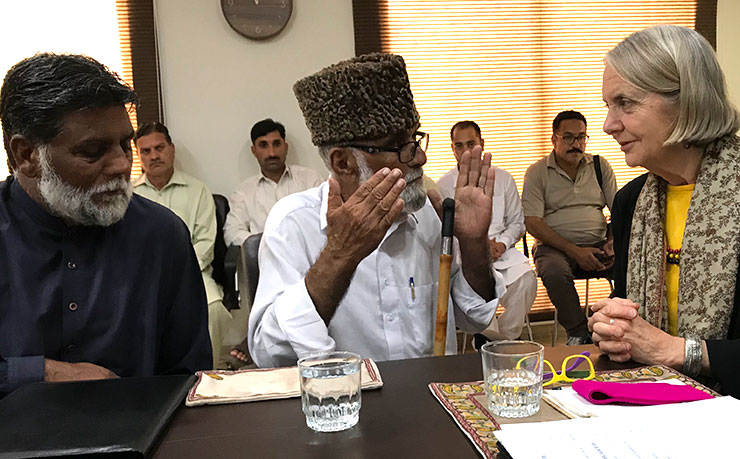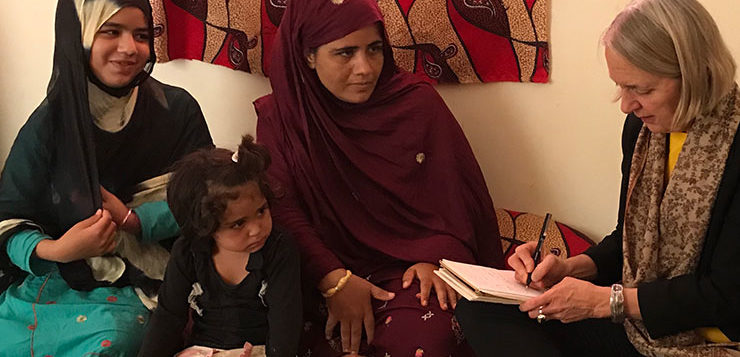Australia has an important role to play in protecting the lives of the people in India Administered Kashmir, writes Lee Rhiannon*.
Thousands of eucalyptus trees line the motorway to Islamabad’s International Airport. As I headed home after six days meeting with Kashmiris and Pakistanis and visiting Kashmir, I took this as a welcome reminder that Australia at times has played a constructive role in this region working with the United Nations on ways to achieve Kashmiri self-determination.
I chose to visit after Kashmiris living in Australia raised concerns with me about human rights abuses in their homeland, and urged that I should see for myself. When Britain finally ended its colonisation of the subcontinent in 1947, the violence was extreme.
Until 1985, Australian military observers were part of the United Nations Military Observer Group in Kashmir. In 1950 Sir Owen Dixon, the sixth Chief Justice of the High Court of Australia, was appointed by the United Nations Security Council as the UN representative to organise a plebiscite on self-determination in Jammu and Kashmir.
The plebiscite, a recommendation carried in a number of UN resolutions, was however never held. This is not a reflection on Sir Owen Dixon. It was a collective failure of governments.
Tragically over many decades the global community from official channels to progressive movements have largely followed a hands off approach to Kashmir. It is astonishing how little coverage the issue receives in the West considering it is estimated that more than 47,000 people have died since 1947. The narrative that this should be left as a bilateral matter has come to dominate.
That could be about to change. The many Kashmiris I met have great hope that the UN human rights report on Kashmir, released in June, sets out the stark dimensions of the conflict and the recommendations have the potential to provide a pathway to self-determination.
The 49-page report reveals that millions have suffered human rights abuses. The harm caused by the pellet-firing shotgun, currently the favoured weapon of the Indian military in India Administered Kashmir, is singled out. More than 6,000 people were injured by the metal pellets from 2016 to March 2017. Many people have lost their sight and at least 17 have died.
The report also notes that up to 145 civilians were killed by security forces between mid-July 2016 and the end of March 2018. Tragically, rape and sexual violence remain weapons of the occupying forces.
Kashmiri women have been largely absent from narratives about this region. The gendered violence that results in thousands of widows, single parent families and women led households heightens women’s feelings of vulnerability, financial insecurity and emotional trauma and stress.

A heartening aspect of the UN report is the authors’ intent that the personal toll behind the statistical analysis must be addressed. In June when the report was released the UN High Commissioner for Human Rights, Zeid Ra’ad Al Hussein called for compensation for the victims, as well as an end to the violence and accountability for past and current violations.
The starting point to achieve the Report’s momentous recommendations is the adoption of a Committee of Inquiry “to conduct a comprehensive independent international investigation into allegations of human rights violations in Kashmir”.
Currently the Indian government is hostile to this recommendation. The Indian Ministry for External Affairs has said the Report “is fallacious, tendentious and motivated”. They even questioned why such a report was even released.
In contrast, the Pakistan Foreign Minister has said his government is ready to cooperate with the proposed UN Committee of Inquiry.
The Report sets out 17 and seven recommendations respectively for the Indian and Pakistan governments to respond to.
While Pakistan was named as an abuser of human rights, the Report notes they “are of a different calibre or magnitude and of a more structural nature”.
In drawing out this distinction my intent is not to fly a flag for Pakistan, but to put a spotlight on the need for western countries like Australia to consider how they deal with the Indian government so it becomes harder for our Indian Ocean neighbour to maintain a rogue response in the face of this important UN report.
Right now, it appears that India’s plan is to try and retain its strategy of restricting news about the reality of life for the people of Kashmir. In July, just weeks after the UN human rights report was released, the Indian government wrote to all foreign correspondents based in its country to remind them that they must apply in writing for permission if they wish to travel anywhere in Jammu and Kashmir. This is being viewed as an extension of the existing ban that prohibits journalists visiting conflict zones in Kashmir.
There is a role for Australia here, as a member of the UN Human Rights Council. The UN report and how its recommendations will be managed should be a regular Council agenda item. Surely the Australian government should lobby the Indian government to lift the ban on foreign journalists and to support the important Committee of Inquiry going ahead, and facilitate the independent investigation having free access within Indian Administered Kashmir.
Australia as an Indian Ocean neighbour has the opportunity to again play a constructive role in this region.
The former UN Human Rights head, Zeid Ra’ad Al Hussein, had the courage to initiate this work. Now is the time to finish the job and take a stand for Kashmiri human rights and to end violence in the region.
If Australia also has the courage to stand up for Kashmiri’s human rights, we can help save lives.
* Lee Rhiannon is a former Greens Senator. She recently visited Kashmir and Pakistan. She paid for her own travel costs. Lee’s program was organised with assistance from aid and community groups, the Pakistan Ministry of Foreign Affairs and the Government of Azad Kashmir. Lee would like to visit Indian Administered Kashmir and has written to the Indian High Commission to request permission.
Donate To New Matilda
New Matilda is a small, independent media outlet. We survive through reader contributions, and never losing a lawsuit. If you got something from this article, giving something back helps us to continue speaking truth to power. Every little bit counts.




